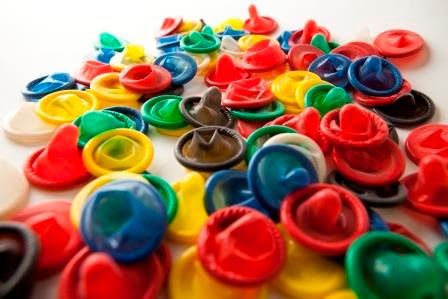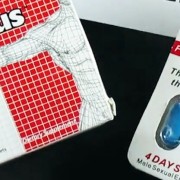11 Myths and Truths About Condoms
A recent study presented that only one third of all young people in the US used condoms last time they had sex. There has therefore come time to once and for all burst the condom myths and brush off some bad rationalizations. Print and save or give away to the nearest teenager.
1. “Condoms smell of rubber”
What else would they smell of? If you have sex, there are a lot of other things that also can smell, so in comparison to that it doesn’t need not be a big problem. If you still think that condoms smell too bad, there are alternatives, such as Billy Boy Aroma with hints of tutti frutti or plastic condom Naked, which is completely odorless.
2. “Foreplay is destroyed with condoms”
It’s all about dexterity. If the condom is within arm’s reach, it does not take more than 20 seconds to get it in place. Practice, practice, practice.
3. “It’s the guy’s responsibility to use condoms”
The usual excuse that naturally circulates only in heterosexual circles. What role does it play who is responsible if someone gets infected? In the end, however, everyone is responsible for their own health. To suggest using a condom implies only that you value yourself and your partner. Nowadays, there are both condoms for men and women. Femidom is a bigger type of condom that women put into the vagina.
4. “It does not feel as good with a condom on”
The difference between sex with or without condom is marginal. For those who are allergic to latex or lubricant however, it may be a big difference, but then there are other options like plastic condoms or condoms without lubricant.
5. “Condoms are expensive”
Nurses at school and youth clinics can get condoms for free for youths between 13 and 25. If you are older than that, there are organizations and foundations working with sexual enlightenment that distribute condoms free of charge or for a low price. A cheap pleasure, considering how much fun you can have with it.
6. “If I use a condom, I cannot get infected”
Condoms are the safest prophylactic against both pregnancy and STDs, but it is not one hundred percent protection. You can be infected by both genital warts and herpes outside the area covered by the condom. Genital warts are a harmless venereal disease, but it is spread very easily. Those infected with little warts may not always have physical discomfort of it, but there’s a risk of itching, burning, insignificant bleeding and discomfort during intercourse. Just as genital warts, herpes often goes away by itself, but it can be very painful if it breaks out.
7. “Two condoms are safer than one”
If you use more than one condom at the same time instead increases the risk of them breaking or slipping. However, it might be good to have two condoms available in case one fails. To really be on the safe side, you can supplement condom with another form of birth control if you want to reduce the risk of pregnancy. Many pills and spirals are subsidized and cheaper to buy for teenagers.
8. “It is difficult to become infected”
Being infected is very simple if your partner is carrying a sexually transmitted disease and you do not use condoms. Some kinds of STDs may be extremely sneaky because it takes some time before they appear. HIV manifests itself after two to three weeks by such symptoms as fever, sore throat, diarrhea, or swollen lymph nodes. After a few weeks, these symptoms disappear and then it may take several years before you see signs of a weakened immune system, shingles, dandruff, eczema or fungus in the mouth. HIV becomes AIDS if you do not get help in time. Chlamydia is a disease which is difficult to detect. It can be completely asymptomatic, but in the end lead to sterility.
9. “A condom can easily reap, so what is the point?”
Condoms are very stretchable and most of them can be pulled out and grow up to a meter long. If they fail, it’s probably because they’ve been rolled on incorrectly. There might have been too much air in the condom during application, or a sharp nail ripped a hole in it. An oil-based lubricant can weaken the condom, so use only lubricant that is water- or silicone-based. Also remember to keep condoms in a dark and cool place, then they will last longer.
10. “You have to be of age to buy condoms”
There is no age limit either to buy or use a condom. It is a practice in some states to actually distribute condoms to boys and girls under fifteen, so that they have time to learn and feel ready to use a condom when the time comes.
11. “It’s embarrassing to buy condoms”
It might awkward the first few times but it is all the more embarrassing to have to explain that one is carrying a sexually transmitted disease. Keep in mind that every year over 48 million condoms are sold in the US, so you are not alone. If it still feels embarrassing you can also order condoms online and get sent to your home in a discreet package.
Research by My Canadian Pharmacy Team – mycanadianpharmacyrx.com











